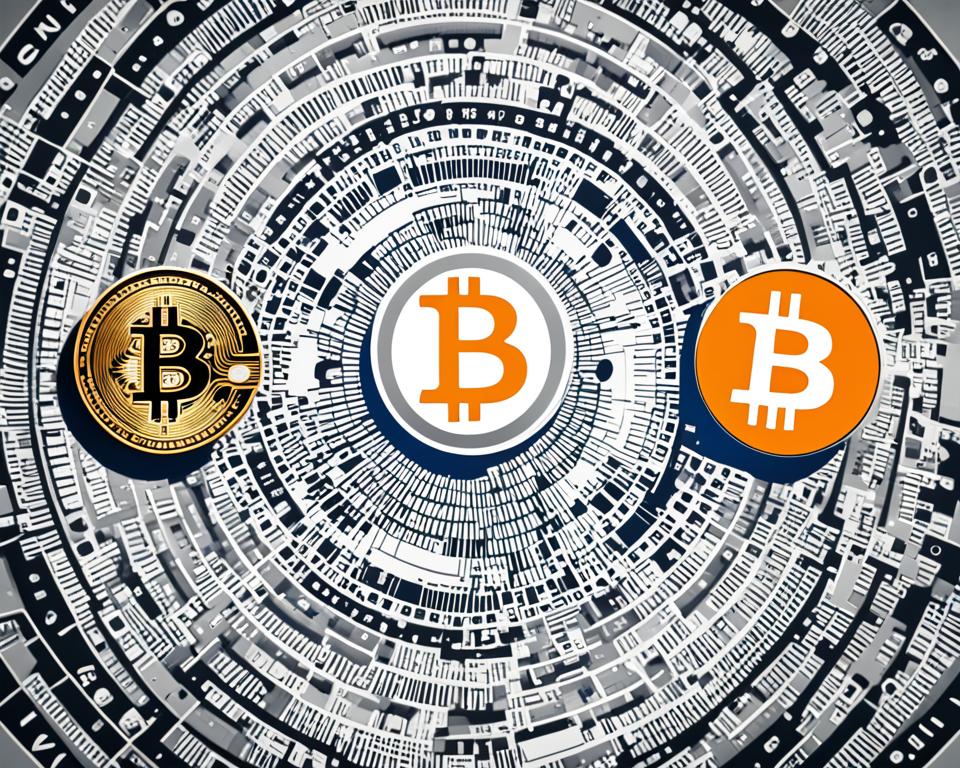Physical Address
304 North Cardinal St.
Dorchester Center, MA 02124
Physical Address
304 North Cardinal St.
Dorchester Center, MA 02124

Explore the world of crypto with our beginner's guide. Learn about digital currencies, blockchain technology, and "What is Crypto? A Beginner's Guide to Cryptocurrency."
Ever been curious about the world of cryptocurrency? Wondered how it compares to money we use every day? We’re diving into cryptocurrency‘s decentralized world, its backbone of blockchain tech, and how it’s changing how we handle money online.
Cryptocurrency is a kind of online money. It uses math to handle buying and selling. Unlike regular money, this online cash isn’t controlled by governments. Instead, it’s looked after by lots of people working together over the internet. This system is run by blockchain technology, known for being open, unchangeable, and not easily controlled by any one power.
Cryptocurrencies have shaken up our ideas about cash and banking. It all started with Bitcoin, the first digital money. Then came many others, like Ethereum, Litecoin, Dogecoin, and even Shiba Inu. Investors, companies, and even countries are paying attention to these digital assets. This has made the cryptocurrency market grow very fast. It also spurred the creation of new ways to manage money online, known as decentralized finance (DeFi) solutions.
What makes cryptocurrency stand out from regular money? How might it change how we do personal or global financial stuff? Let’s dig into these questions and see what the future might hold for this tech.
Cryptocurrency is a digital form of currency. It differs from regular money because it’s decentralized. This means no central authority, like a government or bank, controls it. Instead, it’s managed by a network of users.
Crypto is not tied to the value of traditional currencies or backed by gold. It’s secure, using a special system for checking transactions.
Cryptocurrencies keep the same value no matter how they are used. This is unlike unique items sold as NFTs.
They work using blockchain technology. This makes them very secure and keeps transfer fees low.
| Cryptocurrency | Key Characteristics |
|---|---|
| Bitcoin | The first and most valuable cryptocurrency. |
| Ethereum | Allows for more complex financial transactions than Bitcoin. |
| Litecoin | Aims to simplify payments compared to Bitcoin. |
| Dogecoin | Initially a joke, has become a valuable cryptocurrency. |
| Shiba Inu | Another meme-based token that has gained significance. |
| Stablecoins (Tether, USDC) | Maintain stable values relative to real-world assets. |
The two main ways of making cryptocurrencies are crypto mining and hard forks. Mining validates crypto transactions and makes new digital coins. It needs to check transactions to work right. Miners use special tools and programs to do this and add the verified ones to the blockchain.
Crypto mining is a tough process. Miners compete to solve hard puzzles to verify and record transactions on the blockchain. This concept, called Proof-of-Work (PoW), needs miners to use a lot of computing power. Once miners add new blocks to the blockchain, they earn a few Bitcoins or another crypto.
Not all crypto is made by mining. Some new ones come from a “hard fork.” This makes a new part of the blockchain, different from the first. Crypto made this way is more for investing than buying things. Teams of developers often make these new cryptos through a hard fork.
Creating cryptocurrencies is key to the  world. It allows for more digi-currencies, bringing new chances for people to invest, buy, and make new financial tools.
world. It allows for more digi-currencies, bringing new chances for people to invest, buy, and make new financial tools.
The big difference between cryptocurrency and traditional currency is government and bank involvement. Governments produce and support traditional currency. Paper or metal money can be used for buying things and such. On the other hand, cryptocurrencies like Bitcoin and Ethereum are not controlled by any government or bank.
Governments make and regulate traditional fiat currency. They can impact the money’s value through their rules. Cryptocurrencies, though, work outside any central control, their value changing by how much people want them, not by government decisions.
People keep traditional money in banks or physically hold it. Cryptocurrencies are kept in digital wallets. These wallets can be online or on devices. Unlike banks, if your cryptocurrencies are lost, there’s no way to get them back. This shows why it’s crucial to keep them safe.
Cryptocurrencies like Bitcoin and Ethereum offer special benefits compared to regular money. One of these is better privacy and security. When you buy things with cryptocurrency, you don’t have to give personal details. This protects you from identity theft and other scams.
This also means your investments are safe even if something happens to your government.
Cryptocurrencies can be used all over the world. They’re not limited by country borders or changing exchange rates. This makes buying and selling things internationally easier.
They also allow you to avoid problems like ATM withdrawal limits that come with regular banks.
Cryptocurrency works without a central authority. Nobody controls it all. This gives more freedom to its users. They don’t have to follow rules set by any one government.
The system behind cryptocurrencies is open and clear. It makes cheating or scams harder.

The world of cryptocurrencies is vast, going beyond Bitcoin and Ethereum. Cryptocurrencies appear in different forms, such as coins and tokens. Each type has its unique features and uses.
There are coins and tokens in the cryptocurrency world. But what’s the big difference? Coins run on their own blockchains, quite like traditional money, but in a digital form. In contrast, tokens live on existing blockchains and can do many things.
Tokens might be used for buying and selling, or they could show you own something. This makes them way more versatile than coins.
Bitcoin is the first and most famous cryptocurrency. It’s best known for using blockchain in finance. Then comes Ethereum, offering more than Bitcoin for financial tasks.
There are also many other important cryptos. These include Cardano, Solana, Dogecoin, and XRP. Dogecoin, started as a meme, is now worth a lot. Shiba Inu, a similar token, has advanced features.
Stablecoins are a special type that keep their value steady. Tether and USDC are examples. They’re tied to real-world assets like the U.S. dollar.

Digital assets are changing fast, giving many choices for finance and tech lovers.
Popular cryptocurrencies like Bitcoin and Ethereum use the blockchain. The blockchain is a secure technology for recording transactions. It is like a digital ledger. It’s transparent, so anyone can see transactions on a public blockchain. Also, it’s designed to keep records forever without changing them.
Blockchain uses blocks of data chained together. This structure makes all transactions visible to everyone. Blockchain technology uses encryption to secure transactions. Its decentralized nature makes cheating very hard.
Cryptocurrencies use blockchain for safe and direct transactions. They don’t rely on third parties to confirm deals. This is good because it cuts out extra costs and speeds things up. The blockchain is good for many uses, not just for cryptocurrencies.

Crypto mining validates cryptocurrency transactions and makes new coins. Miners use special computers for complex math to confirm transactions on a blockchain. This is called “proof of work” (PoW), needing miners to solve billions of calculations to check a block of transactions.
Proof of work relies on miners spending a lot of energy to check and add transactions. This process secures the network, making it hard for one group to control it. But, PoW’s energy use has led to concerns about its environmental effects, particularly with Bitcoin.
Proof of stake (PoS) is a newer and more efficient method. It ties new coin creation and transaction verification to how much cryptocurrency a person has, not their computer power. This shift has made processes less demanding on resources and the environment. For instance, Ethereum moving to PoS cut its energy use by 99.9%.
Mining is competitive, using network agreement to validate and secure without a main body. Miners get new coins when they successfully verify a block’s transactions on a blockchain.
Cryptocurrency is a digital currency that lives on the internet. It uses special math for safe money moves. It’s different from regular money because no government or bank bosses it. Thanks to the blockchain tech, it’s open, clear, and changed-proof. This makes it resistant to official control.
There’s more than just Bitcoin. You have Ethereum, too, for bigger deals. Then, there are the “altcoins,” like Litecoin, Dogecoin, and even Shiba Inu. Stablecoins balance against real stuff. When it comes to getting new digital money, there’s mining. This means solving hidden messages to prove deals and earn new coins.
With no big banks in the way, crypto lets people send money straight to each other. It’s quick, and the fees are low. Big names in money, tech, and even the government are watching this space. They see how it could change how we handle cash and data.
| Cryptocurrency | Key Features |
|---|---|
| Bitcoin | The first and most valuable cryptocurrency |
| Ethereum | Supports more complex financial transactions compared to Bitcoin |
| Litecoin | Aims to simplify payments |
| Dogecoin | Initially a joke, now among valuable cryptocurrencies |
| Shiba Inu | Features complex mechanics and is another dog-themed token |
| Stablecoins | Designed to maintain stability against real-world assets (e.g., Tether, USDC) |
Back in 2008, Bitcoin started it all. Since then, hundreds more have popped up. Ideas like TRON came from people trying to shake up entertainment and data.
If you get the basics about crypto, like how it’s non-central and uses blockchain, you’re all set. It helps you understand this new world of money, investing, and cool new apps.
You can’t trade cryptocurrencies on regular stock exchanges. That’s why you use a crypto exchange. There are three main types available: centralized, decentralized, and hybrid.
Centralized exchanges are where cryptos are bought and sold. They use third parties to help with transactions. You can trade using dollars and other traditional currencies, along with crypto.
Decentralized exchanges (DEX) let investors trade without intermediaries. This can mean more security, as there’s no central system to hack.
Hybrid exchanges blend centralized and decentralized exchange features. They offer centralized exchange liquidity with the benefits of DEX security and privacy.
Cryptocurrency has grown a lot in recent years. As of May 2021, it was worth $1.7 trillion. Bitcoin, Ethereum, and Tether are the top three, with Bitcoin leading in value. More companies are starting to understand the worth of these digital currencies.
The growth in cryptocurrency comes from DeFi, or decentralized finance. It uses blockchain to offer financial services differently. You can do things like lend, borrow, and trade without traditional banks and their rules. This new way is getting more popular, boosting the demand for cryptocurrencies.
DeFi is changing how we do finance using blockchain. This makes the system open and clear, without heavy bank rules. With this technology, people can loan, borrow, trade, or manage assets with ease. The more we use DeFi, the more the whole cryptocurrency market is likely to grow.
Cryptocurrency has changed how we view money and finance. It’s digital, decentralized, and has many benefits over normal currency. These include better privacy, security, and the ability to be used worldwide. It’s vital for those new to cryptocurrency to learn the basics, like how blockchain works and about mining. Also, understanding the different types of cryptocurrencies and where to trade them is key.
The likes of Satoshi Nakamoto have started a new financial era with decentralized finance (DeFi). Here, Bitcoin, Ethereum, and other coins are changing the money game. It’s important to keep up with the latest and see how you can benefit from this financial revolution. This way, you can smartly add cryptocurrency to your investment or financial plans.
The technology behind cryptocurrency, namely blockchain technology and cryptoeconomics, is powerful. It offers a safe, open, and decentralized option to the usual financial systems. As the sector grows, advancements in crypto wallets, crypto exchanges, and non-fungible tokens (NFTs) show the vast potential of crypto. We’re just starting to see what this technology can do.
Cryptocurrency is digital money. It works without a bank. It can be used to buy things or as an investment. All transactions are verified and kept on a blockchain.
Cryptocurrency is not made by a government. It comes from various companies. It’s digital and secure. This is because of blockchain technology.
Mining creates new cryptocurrency. Transactions need to be checked. Mining does this and adds them to the blockchain. It also makes new digital coins.
Mining needs special tools and software. Developers can also make new coins in different ways.
Cryptocurrency keeps your personal info safe. Plus, it’s not controlled by a central figure. This means it’s available worldwide with no one controlling everything.
There are coins or tokens. Each has its own blockchain. Bitcoin was the first. Ethereum is another important one.
Blockchain records transactions securely. It’s transparent and can’t be changed. This makes it hard to cheat, unlike older ways of keeping records.
There are three main crypto exchanges: centralized, decentralized, and hybrid. Centralized and decentralized work differently. Hybrid tries to offer the best of both.
The cryptocurrency market has grown a lot. By May 2021, it was worth
Cryptocurrency is digital money. It works without a bank. It can be used to buy things or as an investment. All transactions are verified and kept on a blockchain.
Cryptocurrency is not made by a government. It comes from various companies. It’s digital and secure. This is because of blockchain technology.
Mining creates new cryptocurrency. Transactions need to be checked. Mining does this and adds them to the blockchain. It also makes new digital coins.
Mining needs special tools and software. Developers can also make new coins in different ways.
Cryptocurrency keeps your personal info safe. Plus, it’s not controlled by a central figure. This means it’s available worldwide with no one controlling everything.
There are coins or tokens. Each has its own blockchain. Bitcoin was the first. Ethereum is another important one.
Blockchain records transactions securely. It’s transparent and can’t be changed. This makes it hard to cheat, unlike older ways of keeping records.
There are three main crypto exchanges: centralized, decentralized, and hybrid. Centralized and decentralized work differently. Hybrid tries to offer the best of both.
The cryptocurrency market has grown a lot. By May 2021, it was worth $1.7 trillion. It’s been growing because of decentralized finance. DeFi uses blockchain to offer financial services directly.
.7 trillion. It’s been growing because of decentralized finance. DeFi uses blockchain to offer financial services directly.